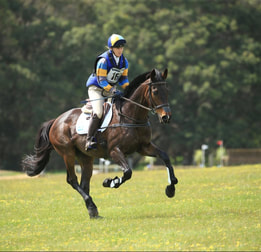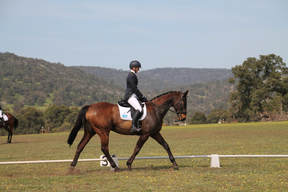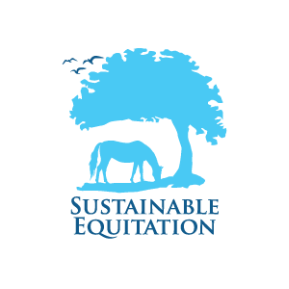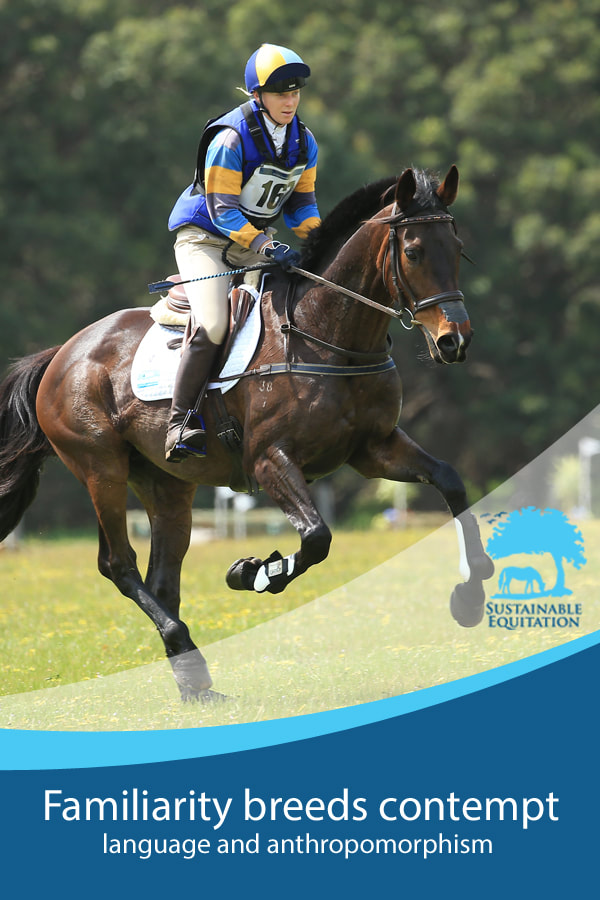
After several thousand years of domestication it’s inevitable that a certain degree of anthropomorphism has crept in to the relationship that we have with our domesticated animals. And perhaps, like familiarity, anthropomorphism breeds contempt. Or, if not contempt, then at least a certain degree of complacency. After all, when we only ever view animals with our anthropocentric glasses on they seem like lesser versions of ourselves. They can’t talk, they can’t drive cars, they can’t update their Facebook status. But what an anthropocentric perspective fails to acknowledge is that if the boot was on the other foot (or paw) it would be us who were lesser versions of them. How slowly we run. How blind and deaf we are. How badly we fly.

I sometimes think that if we had an entirely new language with which to talk about our animals we would be less inclined to compare them with ourselves. As an example, I’m always wary of the word “intelligence” when it is related to horses because it is so loaded with all our human expectations and interpretations. I wonder if the meanings of such words are the sum total of our interactions with them – like a giant filing cabinet filled with snapshots of every usage complete with prejudice and bias. When someone says to me, “I don’t think my horse is very intelligent” I believe their statement is loaded, not just with the completely anthropocentric meaning of the word but also with a compilation of all the times they’ve ever failed a maths test, forgotten their keys or struggled to work out how to turn on their new mobile phone.
Memory is a similarly loaded concept when applied to horses because their memories are arranged and constructed so differently from our own. Here’s an example… We have a ditch at the end of our arena and every couple of weeks we change the jumps over it. It’s a small change but the horses recognise it every time. The riders don’t – they are usually a little bit frustrated that their horse, that last week didn’t seem to mind the ditch at all, is this week rolling his eyes and snorting. It is almost as if we need separate words for the ways that horses and humans store information from the past because memory functions so differently in both species. I’m guessing that people can tell you where they were when they saw the first plane crash of 9/11 because of some primitive wiring in our brains that links shocking events with their location. But for the horse it seems that every single memory is intrinsically linked to real estate. And if you think about his evolution this makes perfect sense – but it doesn’t make the way his memory works any easier for us to understand.
Even if we don’t have a different vocabulary for speaking about horses it’s still important to understand the ways in which the language that we use crafts our reality. Just as it would be difficult to build a space shuttle with parts recycled from a 1960’s Cessna it’s difficult to describe our new evidence based understanding of the horse using language that is hundreds of years old. But if we’re conscious and vigilant about the meanings that words inadvertently bring to any conversation about the horse then at least we are part of the way towards, if not eliminating, then at least illuminanting our inherent anthropomorphism.
As a very wise friend of mine once pointed out, none of us arrives at the side of the horse empty handed. The relationship between humans and horses is a little bit like a 6000-year long marriage. Because the relationship is no longer driven by need it’s as though the kids have all grown up and left home and now it’s just the two of us, sitting around the dining room table trying to figure out exactly why it was that we fell in love in the first place. It’s the perfect time to shed linguistic baggage, because it seems to me that the more we understand the creatures with whom we chare our lives, the more we come to understand ourselves.
Memory is a similarly loaded concept when applied to horses because their memories are arranged and constructed so differently from our own. Here’s an example… We have a ditch at the end of our arena and every couple of weeks we change the jumps over it. It’s a small change but the horses recognise it every time. The riders don’t – they are usually a little bit frustrated that their horse, that last week didn’t seem to mind the ditch at all, is this week rolling his eyes and snorting. It is almost as if we need separate words for the ways that horses and humans store information from the past because memory functions so differently in both species. I’m guessing that people can tell you where they were when they saw the first plane crash of 9/11 because of some primitive wiring in our brains that links shocking events with their location. But for the horse it seems that every single memory is intrinsically linked to real estate. And if you think about his evolution this makes perfect sense – but it doesn’t make the way his memory works any easier for us to understand.
Even if we don’t have a different vocabulary for speaking about horses it’s still important to understand the ways in which the language that we use crafts our reality. Just as it would be difficult to build a space shuttle with parts recycled from a 1960’s Cessna it’s difficult to describe our new evidence based understanding of the horse using language that is hundreds of years old. But if we’re conscious and vigilant about the meanings that words inadvertently bring to any conversation about the horse then at least we are part of the way towards, if not eliminating, then at least illuminanting our inherent anthropomorphism.
As a very wise friend of mine once pointed out, none of us arrives at the side of the horse empty handed. The relationship between humans and horses is a little bit like a 6000-year long marriage. Because the relationship is no longer driven by need it’s as though the kids have all grown up and left home and now it’s just the two of us, sitting around the dining room table trying to figure out exactly why it was that we fell in love in the first place. It’s the perfect time to shed linguistic baggage, because it seems to me that the more we understand the creatures with whom we chare our lives, the more we come to understand ourselves.


 RSS Feed
RSS Feed
